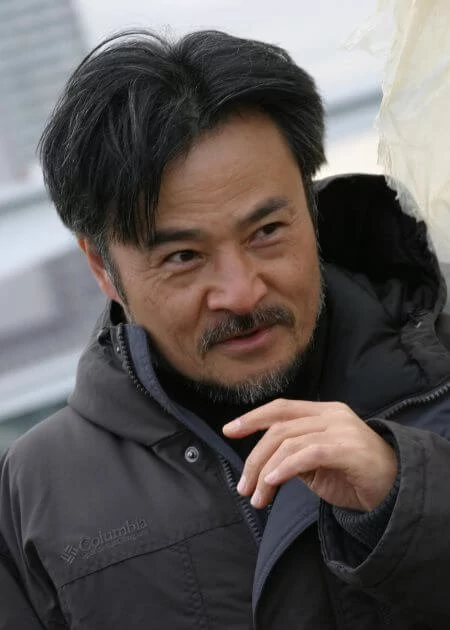
Kurosawa started out directing pinkus, got big riding the Japanese horror wave and excelled with his more dramatic output. He's impossible to pigeon-hole, but still manages to have a clear signature that binds the whole of his oeuvre together.
Movies
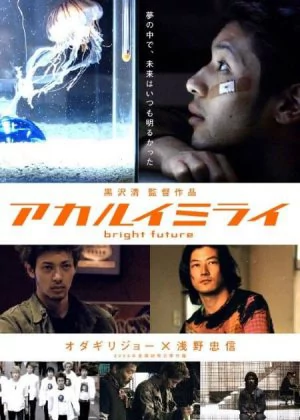
A pretty peculiar Kurosawa. I've seen most of his films by now and his work's been pretty difficult to coin regardless. Even so, Bright Future might be the one that is the hardest to fit into his oeuvre. It's also his best film if you ask me. There's an interesting level of grit, the performances are superb, the film has a few surprising touches of magic realism and it sports a memorable score. The plot is all over the place, then again this is more of a character portrait anyway. I'd forgotten most details as it's been a long time since I last watched it, but Bright Future has lost none of its initial charm.
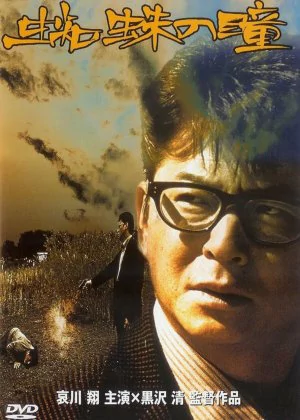
The soundtrack is nice, the rhythm of the film is pretty unique and the bold approach to cutting up the story line is a refreshing change. Kurosawa proves himself an interesting director.
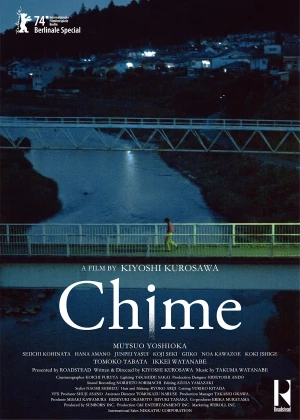
Chime feels like an addendum to Foreboding and Before We Vanish, but slightly better because of the shorter runtime and nicer production values. Not that the film is very explicit or maximalist in its presentation, it's very much a less-is-more horror, it just feels a bit more polished and overall detailed . The cinematography is clean, the performances are solid and Kurosawa builds up the tension really well. It's been quite a while since he's released a more straight-forward horror film, but he still has it in him. The ending is a little puzzling, but that's clearly by design. I liked this a lot better than I thought I would, this was one of Kurosawa's better films in ages.Read all
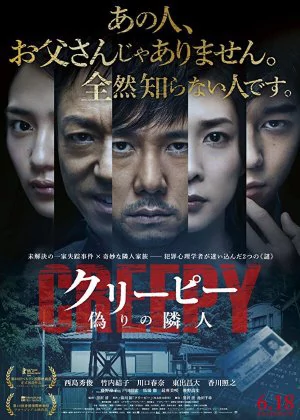
Kurosawa goes for a more straightforward thriller, counting on Kagawa to give the film a little extra flair. And that setup works remarkably well. Creepy isn't the most memorable film within Kurosawa's oeuvre, but Kagawa manages to portray one of the more remarkable villains in recent Japanese cinema history, saving this film from mediocrity in the process. Takakura is an ex-detective who gets a request from an old colleague to help home with a cold case. Six years ago an entire family disappeared, Saki is the only one who remains to tell the tale. Based on her memories, Takakura begins his investigation. Meanwhile, he becomes intrigued by his new neighbor, a strange-looking man who takes care of his sick wife and daughter all by himself. Plotwise there are a few twists and turns, but nothing too surprising or out of the ordinary. The film is pretty long and while a tad more polished than Kurosawa's usual output, it feels a bit by the numbers. Kagawa is the saving grace here, elevating a decent but inconspicuous thriller to become one of the better films in the genre.Read all
The Woman in the Silver Plate
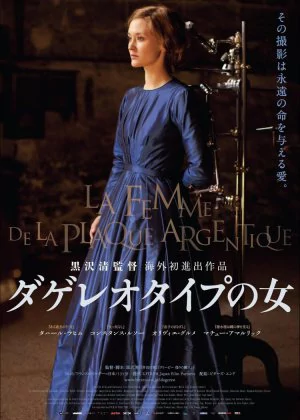
Renowned Asian directors often end up in France instead of Hollywood. I suppose that must be the Cannes effect. Kurosawa is one of the few remaining Japanese directors who enjoys default international exposure, so it's no surprise he eventually made his way to France too. The result is an intriguing little thriller, with no weak points, but no real peaks either. Stephane lives together with his daughter on a grand estate. He is a photographer who specializes in daguerrotypes, a form of long-exposure photography. After his wife died, Stephane dedicated all his time to this art form, with his daughter being his primary muse. Jean, Stephane's assistant, has a crush on the girl, and he feels sorry for the extended d periods she has to spend posing in front of the camera. They make a plan to run away together. It's a fun and interesting setup, and Kurosawa's experience as a horror director serves him well to make the photography scenes a tad creepier, but the film firmly remains on the thriller side. The performances are solid, the runtime a little excessive though the plot never gets dull. It's an interesting and quirky addition to Kurosawa's oeuvre, but not a peak film.Read all
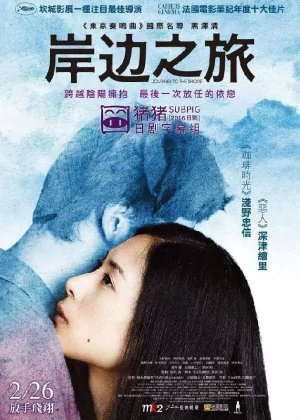
A solid drama from Kurosawa, that lacks that little extra to be a real standout. There are some interesting themes at play here and with a bit more attention to the presentation I think this could've been a personal favorite, but all in all, I found the film to be a little too docile and non-committal. I have this with more Kurosawa films though, so I may just not be gelling with his style. Three years ago, Miyuki's husband disappeared without a trace. He was thought to have drowned at sea, but Miyuki can't accept that version of the story. Then one day her husband turns up at her doorstep. The two reconnect as if nothing happened and go on a little journey together, though it's clear that their relationship isn't what it used to be. The performances are strong and the film features some rough/challenging themes. All the elements were there for a riveting drama, it's just that there's a bit too much focus on some of the narrative elements (which are less interesting), leaving the characters a little underdeveloped, and passive. Still, if you're a fan of Japanese drama (or Kurosawa's work in particular), it's a worthwhile film.Read all
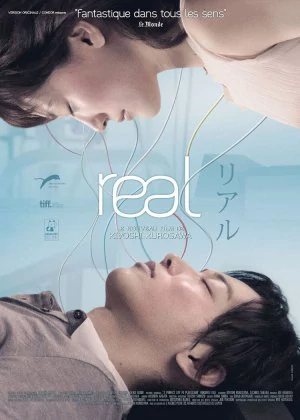
An interesting genre-bender from the hands of Kurosawa. Real is a thriller/mystery with light drama touches, but there's also a bit of sci-fi and horror in there to make it all a tad less expected. And Kurosawa does a solid job. Like most of his films, the presentation could've been a little tighter, but if you're looking for something a little different, this one fits the brief. Koichi and Atsumi are a couple that have known each other all their lives. They are good together, but one day Atsumi tries to kill herself and ends up in a coma because of her suicide attempt. Koichi is clueless until he learns of a new method called "sensing" that should allow him to contact the minds of people who are in a coma. Films that don't reveal their (plot) structure right away always get extra points for effort, it's especially nice for a more mystery-oriented film. The performances are good, the film kept me guessing until the finale and even though not everything works equally well it was nice to see Kurosawa play with different genre influences. Good fun.Read all
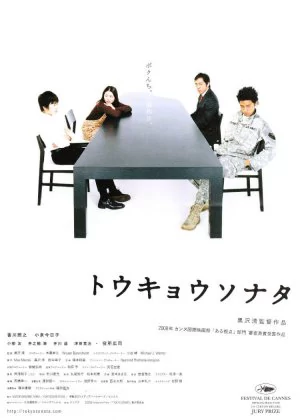
Kurosawa going for a more straightforward drama. Just imagine if the script for Visitor Q didn't land on Miike's desk but was handed to Kurosawa instead, and you should have a pretty decent idea of what to expect from this film. It comes with minor genre influences embedded in the plot, but for the larger part, this is a pure drama. The film focuses on a very typical Japanese family, or at least, one that looks typical from afar. On closer inspection, the family unit isn't as tight and organized as it wants to appear. The father has been fired and doesn't dare tell his wife, the oldest son hardly comes home anymore, the youngest is taking piano lessons without his parents' approval and the mother feels she can't be the glue that holds everything together. Back then, this was one of Kurosawa's first forays into drama cinema, by now it's pretty much familiar territory for fans of the man's work. There are some interesting themes and plot choices, the performances are good, but the styling is a little underdeveloped and it doesn't quite do enough to set itself apart from other films. Quality work, but it lacks that little extra to truly stand out.Read all
Kazuo Umezu's Horror Theater: Bug's House
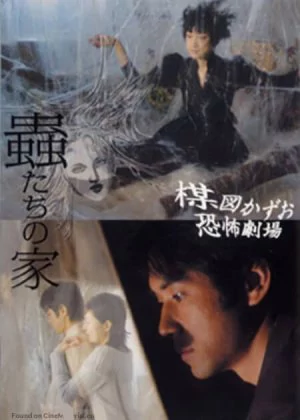
One of the better entries in the Kazuo Umezu series. Umezu is a lauded horror writer so it's no surprise his work ended up as a source of inspiration to feed the wave of horror that was coming out of Japan around that time. Bug's House isn't the most overt horror of the bunch (expect something close to a Rampo story), but it's a fun and moody short from the hand of Kurosawa. Koji is a little worried about the well-being of his wife, so he asks his mistress if she is willing to visit their house and check up on her. When Koji's mistress arrives she can't believe what she finds there. Koji's wife in her turn has been talking to one of her friends about the problems in her marriage, but she tells a very different story. With Hidetoshi Nishijima in the lead you know the performances are nothing to worry about. The horror is a bit limited though, but as long as you expect more of a dark mystery you won't be too disappointed. It's a film that reminded me a little of Iwai's Undo but with a stronger genre twist. Good stuff from Kurosawa.Read all
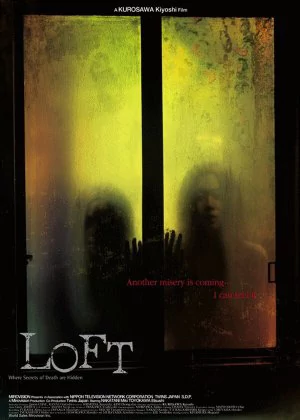
A twisty horror from the hands of Kiyoshi Kurosawa. I had it booked as one of my favorites of his, but watching it again it didn't quite hold up. It's still a solid, very moody, and atmospheric film, but there's not quite enough there to separate it from a bunch of similar-looking Japanese horror films. The music is the big star here. It adds oodles of atmosphere, but that alone isn't enough to make a creepy horror film. The scares are a bit expected, the cinematography a little too dim, and the plot starts to dominate the mood near the end of the film. It's still a worthy film, well worth watching if you're looking for some prime horror filler, but a true favorite it is not.Read all
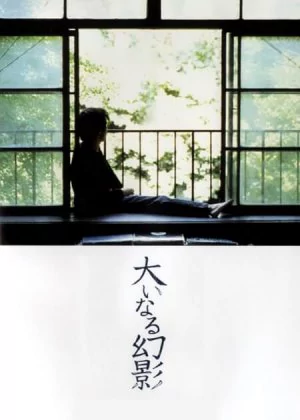
One of Kurosawa's least accessible films, but a boon for those who appreciate the nihilist cinema that flourished around the turn of the century. Not that I'm fully vibing with the film's themes and messages, but I did appreciate the atmosphere Kurosawa managed to establish. This one is for the true arthouse heads though, make no mistake. A musician and postal worker fall in love with each other. They plan to marry and start a family together. After that, their lives grind to a halt and it seems they have little interest in becoming actual adults. When a strange pollen hits Tokyo, they volunteer to join a test program that may provide a cure and save the rest of the population. Or so the plot I found online goes, as I had quite some trouble piecing everything together while watching. There isn't much dialogue, the characters are extremely introverted and the pacing is slow. And while I would've appreciated a more polished stylistic approach, Kurosawa does manage to create a very strong and solemn atmosphere that pulled me into the film. Not an easy film to recommend, but I did like it a lot.Read all
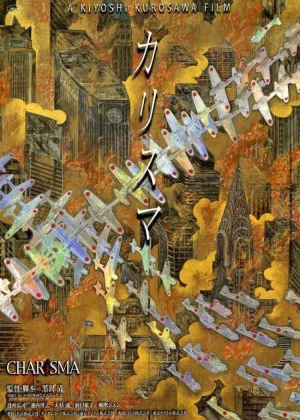
Not everyone will agree with me, but I generally prefer Kurosawa's films that distance themselves from the horror genre. Charisma has a pretty peculiar setup and there are some horror remnants present, but this little eco-war movie is far removed from the likes of Cure, Pulse, or Seance, and it's a much better film because of it. After he messes up an investigation, police detective Goro removes himself from the city and retreats into the mountains. He won't find peace there though, as he gets involved in a quest to save a tree. The tree is a source of contention for three different groups of people, and Goro finds him in another situation where his course of action will directly determine the outcome. A peculiar but fun setup that allows Kurosawa to play with different elements, while also allowing him to reflect on life whenever the film slows down a little. It's another feature of his that requires effort on the audience's side and I'm bummed that it's once again a stylistic misfire, but it's an easy recommendation for fans of the man's work. Pretty unique.Read all
Suit Yourself or Shoot Yourself!: The Hero
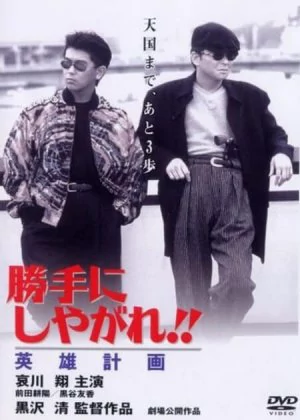
Remarkable TV film from Kiyoshi Kurosawa. Strong performances from Sho Aikawa, Susumu Terajima and Ren Osugi, combined with a wacky plot make for surprisingly fun film. The styling is bland, to be expected from a TV production, but the cast and plot make well up for that.
Suit Yourself or Shoot Yourself!: The Loot
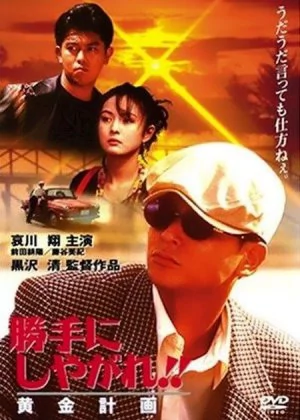
The Loot is Kurosawa's third entry in the Suit Yourself or Shoot Yourself series, a cute TV-born film series sporting Sho Aikawa as a spirited detective. While these films are hardly representative of Kurosawa's oeuvre, they are a lot more fun than they have any right to be, and The Loot is probably my favorite of the bunch. Getting your hands on them may be tricky though. Yuji and his partner take on an assignment to locate an old man. When they finally find him he runs away from them. It'll be the last thing he ever does because he gets a heart attack and drops dead. Yuji doesn't get paid, but he does inherit the man's possessions. Among them is a clue to a buried treasure, 50 million yen pocket money Yuji can surely put to good use. Aikawa is a lot of fun here, other actors like Osugi are also an asset. The shorter runtime helps to make everything a bit more palatable and even though the film's TV roots are obvious, The Loot does sport some slight cinematic qualities. It's not what you call essential cinema, but if you want a better idea of Kurosawa as a director, give this one a shot.Read all
Suit Yourself or Shoot Yourself!: The Nouveau Riche
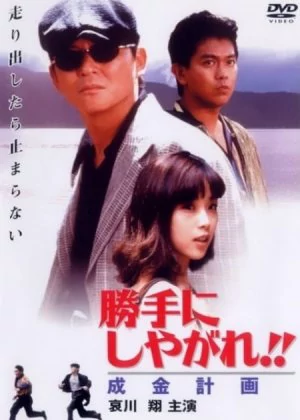
Fifth entry in Kurosawa's Suit Yourself series, the final one for me. One of the better ones too, with flashes of Miike and Kitano that bring some extra flair to the film. The setup and vibe should be familiar by now, Kurosawa doesn't change too much there, he just puts his main characters in a different situation. Aikawa and Maeda run into a girl who just happened upon a trunk full of heroin. They come up with a plan to sell the drugs and in no time they have a couple of buyers lined up. They try to take advantage by driving up the price, but the people they're dealing with aren't really happy when they find out they're being played. Aikawa and Maeda's schemes to get rich are pretty fun, the comedy is goofy and enjoyable, the pacing is slick and there are some memorable scenes. Its TV roots are still quite obvious, but a good cast, entertaining vibe and short runtime make sure that this never becomes a big problem. Good fun.Read all
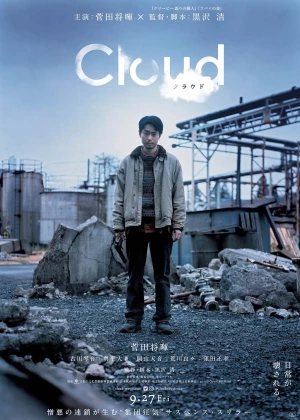
A film divided into two very distinct parts. The start of the film is rather calm and subdued, slowly setting the stage for a second half that ends up being more gun-fueled. I'm not sure if it even works all that well, but both halves kept me entertained, so Kurosawa must've done something right here. The performances are fun (Arakawa is a standout), the build-up of the tension is proper and the final hour is amusing. The presentation is a bit dire though, and it still feels like two separate films in the end. It's better than Kurosawa's French excursion, but far from his best work.Read all
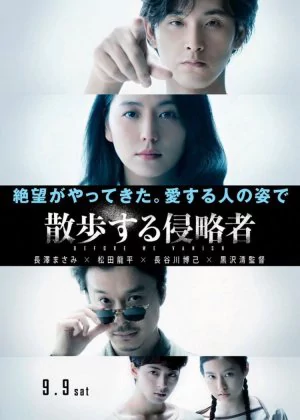
Kiyoshi Kurosawa's invasion flick is not so much about aliens, instead it's more about humanity. Some nice ideas and interesting scenes, but overall the atmosphere is a little lackluster and the tone of the film is surprisingly jolly. Not his best work, but still above par.
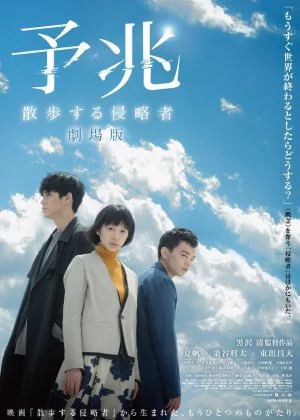
Weird follow-up to Before We Vanish. It's not a sequel, not a prequel, almost a remake but not quite. Kurosawa delivers an alternate version of his previous alien film, one that shows more similarities than differences, but still works as a seperate film. The film itself is decent, but overly long.
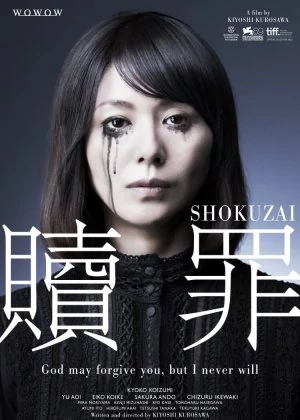
Kiyoshi Kurosawa joins the miniseries hype. This short 4-epper feels like a long film, except that it lacks the cinematic qualities that make feature films so special. Not that Penance is bad, it's a perfectly serviceable narrative, and Kurosawa's inherent skills for directing these kinds of stories are present, it's just not enough to fill four whole hours. Fifteen years ago Emily was murdered by a mysterious man. She was playing outside with four of her friends, but they claim they didn't see what happened to Emily. Emily's mom doesn't trust their stories and she curses them. It's a curse that will linger, and each of the kids will have to confront the consequence of their unwillingness to reveal the truth. The performances are solid, while the setup of the plot is interesting enough and helps to cover the more episodic nature inherent to a miniseries. But 270 minutes is a hefty chunk of time and Penance fails to keep the tension going for the entire runtime. It's a classic example of why I prefer feature films over series. Not bad, but not fully worth the investment.Read all
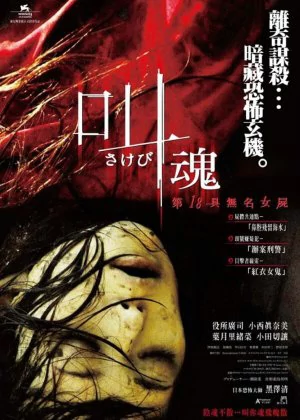
A mediocre Kurosawa that is saved by a solid finale. Don't expect a true horror film, even though the plot description may hint at one. While there are ghosts present, they're just narrative devices rather than a means to shock or scare. Instead, this is a mystery with thriller elements, or call it a detective story with supernatural influences. A police detective is assigned to solve a mysterious murder. During his investigation, he gets the feeling he may have something to do with the crime, as dark parts of his past float to the surface. Things get even hairier when it becomes clear he is dealing with a serial killer. The detective's mental health becomes an issue when he starts getting visits from a ghost in a red dress. The story itself isn't all that interesting, and the supernatural elements feel flimsy. It's a good thing then that the performances are decent and that Kurosawa could count on a quality score to make things a bit moodier. The final third of the film benefits the most and manages to tack on an amusing ending to what is an otherwise lackluster film.Read all
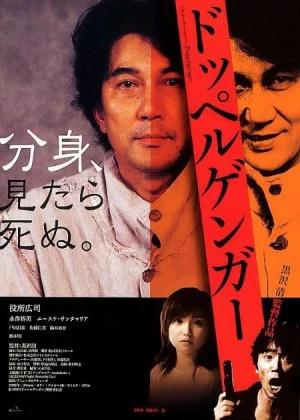
A rather peculiar Kurosawa. I had a little trouble figuring out what vibe he was going for here. It's not a particularly tense film, nor a very funny one. The tone is pretty light, but the film isn't without some more serious moments either. Wherever the case though, the premise is interesting, there just wasn't enough besides that to pull me in. A scientist is making his company good money. Currently, he's working on a wheelchair prototype that will revolutionize the lives of patients. He feels a lot of pressure to complete his work and this puts him in a downward spiral. Out of the blue he bumps into his doppelganger, who assures him the wheelchair will turn out to be a proper success. Yakusho fans will be happy to hear he's playing the lead (or two leads for that matter), Kurosawa fans can rest assured that this isn't some generic genre film. There are some interesting scenes scattered throughout, the finale in particular is pretty memorable, but the film lacks a clear identity and in the end, there's not much that truly sticks out.Read all
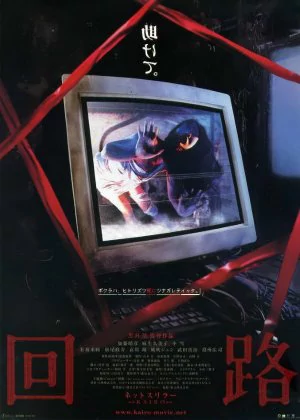
An interesting premise and some memorable scenes. Pulse is a worthy horror from Kiyoshi Kurosawa, but it's a bit too long and there's too much filler in between the good parts. With 30 or so minutes cut, this could've been a real J-Horror classic, but fans should give this one a shot if they haven't already. There's some real thought behind the premise, and there are some creepy, haunting scenes. The grim cinematography and subdued performances help with the mood, but Kurosawa drags certain parts out too long. The pacing issues make it harder than necessary to get fully immersed, which is a shame for this type of film. Slightly better than I remembered it to be though.Read all
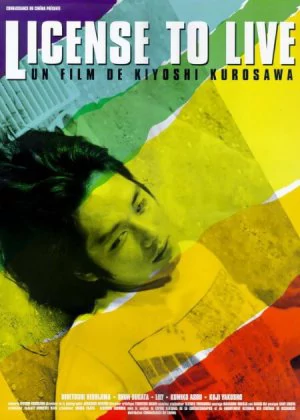
Kurosawa mimics Kitano. This film reminded me a lot of Kitano's films, minus the Yakuza. But the stark editing, the mix of drama and comedy, and even some of the jokes seem to be taken directly from the infamous comedian's work. That's not a bad reference, though Kurosawa struggles to add something of value. When Yukata wakes up from a coma, he finds his life in shambles. His memory's mostly gone, His father is on a trip, his family didn't stick together and the man who hit him with his car years ago tries to buy off his guilt. Yukata goes to live with a friend of his dad's, who is tending to his home. Slowly his former life comes back to him. The film is off to a rocky start and the first 45 minutes or so feel like a real struggle. After that things get progressively better and Kurosawa starts to find his groove. It salvages the film, the final 20 minutes or so are pretty cool and original, but as a whole, it's not enough to make this a bona fide Japanese classic. Vintage Kurosawa in other words.Read all
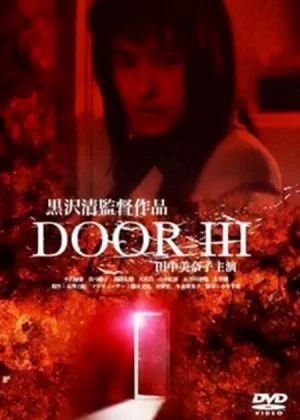
Just recently the first two Door films were finally made available in the West, Kurosawa's part 3 already got a little love before. That's name recognition for you. It's not the greatest horror film in the world, but it's a solid one, with some moody scenes and references to both Ringu and Cronenberg. Not too shabby for an old Kurosawa film. Kyo is an ambitious saleswoman who goes from door to door to try and sell insurance. She's very good at her job, but it gets her into serious trouble when she visits a man who shows more interest in Kyo than he does in the goods she sells. Before she knows it she has a stalker on her tail. And as it turns out, he's not just any old stalker. The film looks its age and the setup is quite simple, though there are a few minor but interesting twists. But for the most part, this is Kurosawa going through the genre motions, with the result being pretty entertaining regardless. Some tense moments and the obligatory Ren Osugi cameo add a little extra flair, so if you're looking for solid genre filler, you can't go wrong with this one.Read all
Suit Yourself or Shoot Yourself!: The Gamble
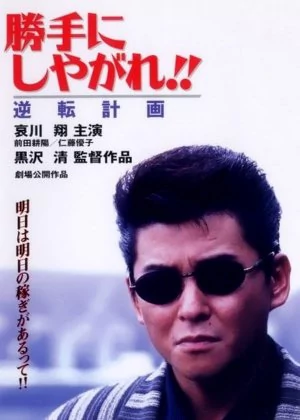
The fourth entry in the Suit Yourself of Shoot Yourself series is another amusing crime romp. Kurosawa shot these six films in a period of two years time, so it's no surprise that the quality is pretty consistent. It's light entertainment that was able to rise above its humble origins thanks to a great cast. Yûji likes a gamble from time to time, but his partner is infinitely more lucky than he is. It gets on Yûji's nerves, whenever he tries to outdo his partner luck isn't on his side. Things are looking up when he finds 10 million yen, what Yûji doesn't know is that the money belongs to the Yakuza. Sho Aikawa and Koyo Maeda form a great pair, the brisk pacing is well appreciated and the light atmosphere makes the film extremely easy to digest. It probably won't make many people's best-of lists when they consider Kurosawa's oeuvre, but it's perfect filler material that easily succeeds in what it set out to accomplish.Read all
Suit Yourself or Shoot Yourself!: The Escape
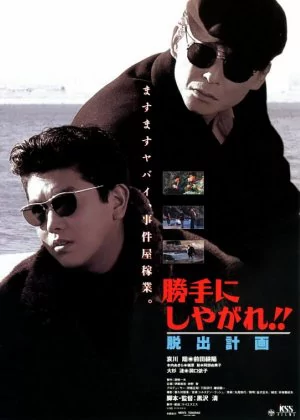
The second entry in one of Kiyoshi Kurosawa's lesser known franchises. It's not too surprising the Suit Yourself of Shoot Yourself films never became a big success, it is after all a series of Japanese TV films. The lighter tone, the excellent cast, consistent quality and short runtimes make this a franchise well worth exploring. Yûji's latest assignment involves tailing the daughter of a Yakuza boss. He finds out the girl is hooking up with a boy in secret, something her father doesn't appreciate in the least. After this discovery, he offers Yûji a big lump sum of money if he captures the boy and brings him in. Show Aikawa is a great lead, with actors like Sabu and Ren Osugi backing him up Kurosawa was able to assemble a great cast. The film isn't too serious, the story isn't dragged out unnecessarily and even though it lacks a little visual flair, the entertainment value is high. A solid entry in a solid series.Read all
Suit Yourself or Shoot Yourself!: The Heist
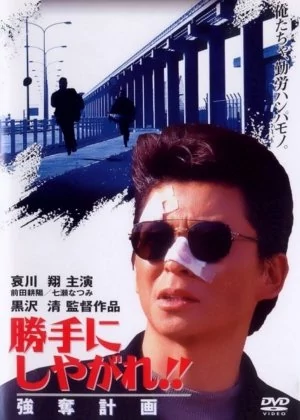
Fun and quirky little crime comedy. The Suit Yourself films may be developed for TV, but the acting talent is top-notch and Kurosawa's direction is on point. While essentially little more than simple genre exercises, the tone is just right and the mix of comedy and gangster business is pretty entertaining. Solid.
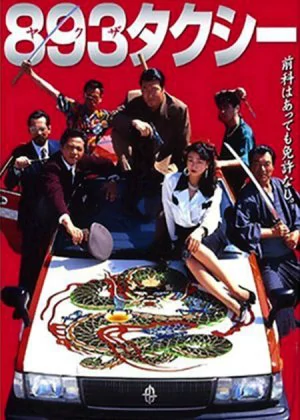
One of those films that helped Kurosawa separate from his pinku past. It's a rather basic genre effort, a cute Yakuza flick that feels more like Kitano than Miike. But it is short and it is entertaining, and it's the type of film a director like Kurosawa needed to learn the tricks of the trade. Yakuza fans would do well to seek it out. A small Taxi company gets into trouble after they loan some money. The owner of the company has friends with a local Yakuza gang, and the leader decides to help him out. He sends some of his men to work off the company's debt, but Yakuza members aren't made to be humble, competent taxi drivers. Even so, they take their mission seriously. Don't expect much hardened Yakuza action, this is a pretty lighthearted film with most of the comedy coming from these tough criminals being forced to do a submissive job. Fun cameos of Osugi and Terajima brighten up the film, the premise is fun and there are some amusing moments, the presentation is a little lacking though. Still, if you're looking for something cute and short, this one won't disappoint.Read all
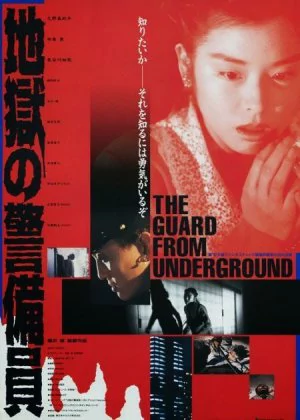
A pretty decent early Kurosawa, made back when horror wasn't quite J-horror yet. The plot's a little wonky and Kurosawa's films were never the prettiest to look at, but there are some memorable scenes here and the bad guy is pretty enigmatic, so despite some minor setbacks I had a pretty entertaining time with it. Akiko is a young, smart, and ambitious woman. She goes to work for a company that deals in art. She is excited about her new job, but then a somewhat dubious security guard is hired. Akiko doesn't trust the guy and she believes he might be a serial killer on the loose, after hearing that one has just escaped from prison. It's certainly not the most scary horror, and that somewhat colorless early 90s Japanese look isn't the most sexy either, but Kurosawa still manages to create some moody scenes. It's fun seeing a young Osugi, the rest of the performances are decent too and the setup, while a bit odd, does have its appeal. A solid film in other words, just don't expect the world of it.Read all
Wordholic Prisoner
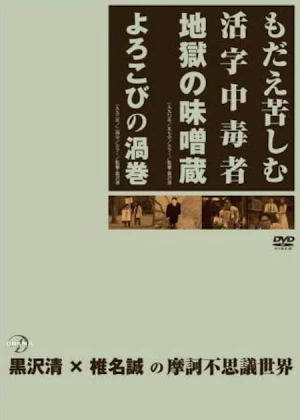
I'm not the biggest fan of TV movies, but Kurosawa was quite apt at them. I've seen a bunch of him so far and they tend to be surprisingly amusing. Wordholic Prisoner is no exception. Thanks to a spirited performance of Ren Osugi and a kooky premise this turned out to be very amusing. Mind you, this is a comedy first and foremost. It's not to be taken seriously, but there are some crime and thriller elements present (namely the kidnapping of a person). It's all pretty absurd though and you shouldn't expect anything too fancy, but if you've got an hour to spare, you could do a lot worse.Read all
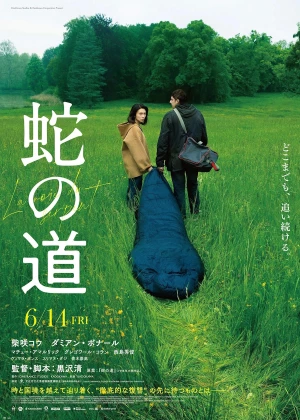
Kurosawa remakes his own film in France, 26 years after the original's release. I can't remember too much from the original, apart from the fact that I wasn't a big fan. This remake doesn't seem to fare much better. I know Japanese directors love to cross over to France, but you have to wonder why Kurosawa bothered with this one. It's a nice chance for Shibasaki and Nishijima to get a bit of extra international exposure, though I don't think this will do their careers any good. The thriller elements are lackluster, the presentation is bland and the performances aren't great. The plot keeps the mystery alive until the very end, I just wish there was more to it.Read all

Kurosawa is struggling lately. His latest is an interesting attempt to bring two nations together, but the result is equal amounts culture clash and xenophobia, that doesn't have much to add to what's already out there. There are some individual scenes that stick out, but overall it's just very basic and expected.
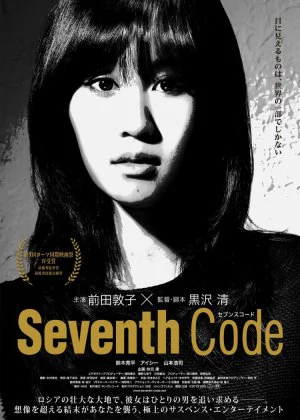
A short and rather strange experiment. It's hard to say what drove Kurosawa to make this film, I'm still not entirely sure what the point of it was exactly, but ultimately I found it to be one of his lesser films. The ending does explain quite a bit, but the road to get there was rather painful and made this film feel much longer than it actually is. Akiko met Matsunaga in Tokyo, but they lost track of each other. When Akiko hears he might be in Vladivostok she travels there on a whim. She has no other leads so she aimlessly walks around the city until she finally bumps into him. Matsunaga doesn't have any recollection of Akiko, only having gone through all that trouble, she is adamant to find out what happened to him. The problem with Seventh Code is that it spends way too much time on the wandering part, making it feel like a (relatively poor) traveling blog. The ending is nice and clears up a lot, but it doesn't absolve the 2/3th that came before. The film doesn't feel like core Kurosawa either, so I'm declaring this a failed experiment. The film is not without merit though, so fans of his work should definitely give it a go.Read all
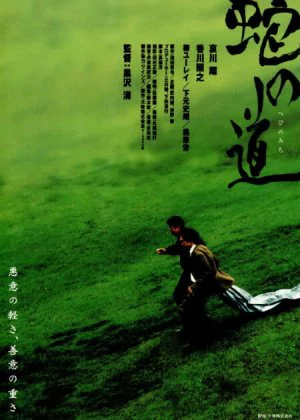
The other half of Eye of the Spider. Shot back to back, with the same cast, this for me is the weaker half of Kurosawa's little experiment. It's an entertaining story with some classic Kurosawa touches, but after having seen the film, there's just very little to come back to. Too much basic narrative, not enough cinematic prowess. Two guys set out to kidnap a Yakuza member. They believe he has molested and killed the 8-year-old daughter of one of them, but after torturing him for a while it becomes abundantly clear they have the wrong guy. Lucky for them, the Yakuza member sympathizes with their story and he even joins their quest to find the true culprit. Kurosawa starts mid-story and isn't too keen on fleshing out what happened before, which is an interesting narrative variation. The performances are solid, but the presentation is a little dry and even though I never lost my interest while watching, there isn't much beyond the story being told. It's a decent enough film, but it lacks character, something distinctive that sets it apart from the rest.Read all
The Revenge: The Scar That Never Fades
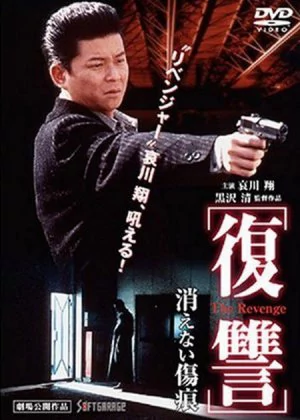
Kurosawa's take on the Yakuza genre. It's not the most original film, so it's best to consider this more of a genre exercise than anything really meaningful. At times it feels like a poor man's Kitano, but if you like Yakuza flicks there's more than enough genre fluff to keep you entertained. The nice cast alone is reason enough to give this one a go. It's been five years since Anjo lost his wife and quit his job as a policeman. He is working for some petty criminals now, but then he finds out something that can incriminate his former bosses. He starts an investigation, but it'll be tricky to gather enough evidence to put the real culprits away, as they are protected by people willing to take the fall for them. Aikawa is always fun to watch, having Nao Omori and Ren Osugi in supportive roles only improves the situation. The plot is very basic though and Kurosawa doesn't really add much to it. The kills are rather dry and the Yakuza love to loiter but if that's your thing there are way better films out there. Still, this is decent genre filler if you're looking for a short and sweet Yakuza film.Read all
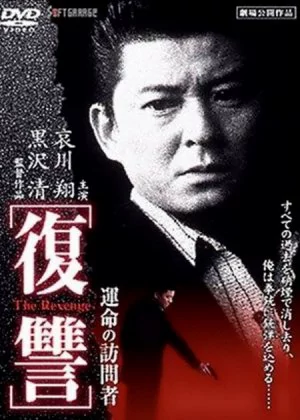
The first part of Kurosawa's Revenge duo. Don't get your hopes up too much, this is genre filler of the simplest kind, with only Sho Aikawa's lead performance and some very minor signature Kurosawa touches to set it apart from a slew of other films. It's not a bad film, it just feels more like a genre exercise than a core Kurosawa project. As a young boy, Anjo saw how his parents were killed. It awakens a sense of justice inside of him and he becomes a police officer. On the job, he runs into the criminals who murdered his family all those years ago. Anjo wants to bring them in, but he'll have to break the rules to do so. It's a simple story, so don't expect too many major twists. Once the setup is clear things do get a bit more interesting and Aikawa's natural flair makes it a relatively easy watch, but there's not going to be much here you haven't seen before. Still, basic Kurosawa filler is still a lot better than many other films, as long as you get your expectations in check.Read all
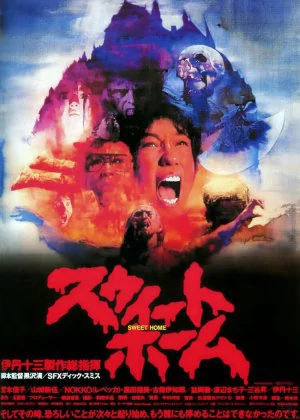
A classic haunted house horror from the hands of Kiyoshi Kurosawa. It's a typical 80s product, released in tag with an old video game. It's standard genre fare, with some slightly more interesting scenes popping up toward the finale. It's a fun curiosity if you're into 80s horror (or you're a Kurosawa completist), but a great film this is not. A film crew wants to make a documentary on Mamiya Ichiro, a famed painter. They set out to the house where he used to live, but when they get there they discover the house is haunted by Ichiro's late wife. While searching the place, they bump into some disturbing paintings, which will lead them to discover the gruesome past of the house. If you've seen a few of these haunted house films you should have a good idea of what to expect. The second half is a tiny bit crazier, but Kurosawa doesn't stray too much from the usual genre cliches. Horror would change tremendously in the years after that, so it's interesting to see Kurosawa make an oldskool genre effort, but there's little appeal beyond that.Read all
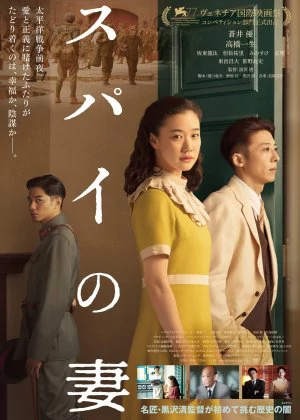
Kurosawa's latest is a big disappointment. My expectation were pretty low going in, as the promo material was pretty clear about what type of film this was going to be, even then it felt lazy, uninspired and obsolete. Kurosawa might want to take a good, long look at his work and try to reinvent himself again. The performances are decent, Aoi and Takahashi are seasoned actors, but that's not enough to keep this film interesting. The cinematography feels outdated, the plot is predictable and the soundtrack is uninspired. It's yesteryear's cinema, no surprise then it did manage to steal some critical acclaim and festival prizes. Subpar considering all the talented people involved.Read all
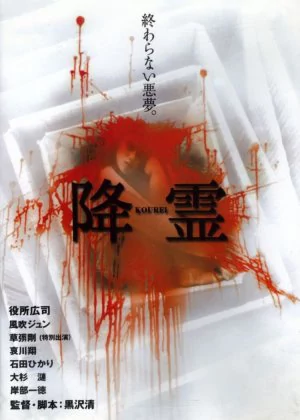
A disappointing Kurosawa. The man is able to build tension, I'll give him that. But that's not enough to make a good film. I often wondered if a better art director could've made the necessary difference, and I think Seance answers that question. The film looks so incredibly ugly that it becomes an actual distraction, something that drags everything down. The police are tailing a notorious kidnapper. They can catch him, but the man remains silent about the location of his latest victim. With few options left, the police decide to try something different. They contact someone with paranormal powers, but it seems like she is actively trying to sabotage the investigation, only adding to the desperation of the police. There are a few decent, tense scenes scattered throughout, but the plot is pretty basic and predictable and the film looks like it was shot by a blind person, so I never really got into it. Kurosawa made few real stinkers, but this is one of them, not even Koji Yakusho's presence can do anything to fix that.Read all
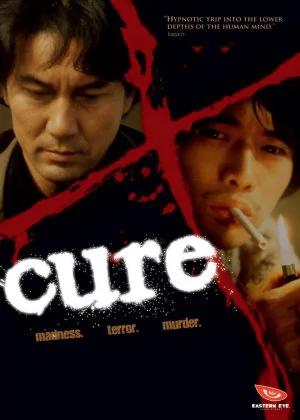
The combo Kurosawa/Yakusho turned out to be a commercial success, though I can't say I was a major fan at first. Kurosawa's films were stylistically too dry and too focused on their narrative. The setup is interesting enough here, but I didn't really care for the execution at all. It doesn't help a film like this took 2 full hours to reach its end. A string of murders is keeping the police quite busy. Each time the victim is found with an X mark on their neck. Much weirder is the fact that the murderers are found right next to their victims, though they can't remember anything about what they did. The only thing these murders have in common is a young man found in the vicinity of every single one. He seems to be having a strange effect on the people around him. The setup is pretty cool, the rest of the film is too grim and dull though. Yakusho fails to excite, the cinematography is dreary and the pacing is too slow. The score is about the only nice thing about Cure, but it's not enough to make any real difference. Early Kurosawa was very hot-and-miss for me, this was another clear disappointment.Read all
The Excitement of the Do-Re-Mi-Fa Girl
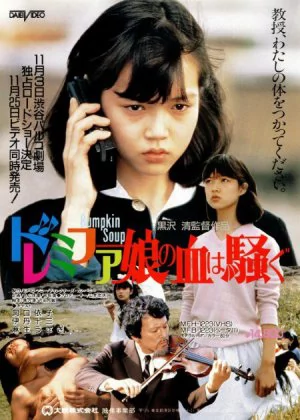
It's no secret that, like many others in the business, Kurosawa started his career as a pinku director. It's a niche that gives young directors lots of freedom, and The Excitement of the Do-Re-Mi-Fa Girl didn't leave that potential unexplored. It's not a very good film though, and it certainly didn't push the boundaries like many others have managed. A young and naive country girl comes to Tokyo, hoping to find one of her childhood friends. Tokyo is a big city though, and her search takes her past some rather questionable characters. A horny student won't leave her alone, and a psychology teacher researching the concept of shame shows a special interest in the girl. Kurosawa goes for a more comedic angle, but the film just isn't all that funny. The presentation is poor, the performances aren't particularly great either and the plot is as thin as they come. There are some interesting/memorable moments scattered throughout, but that's not enough to save this film from its inherent limitations. Read all
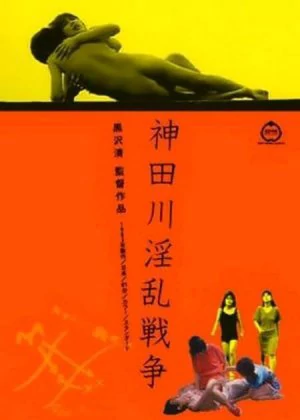
Pinku cinema is often lauded for the freedom given to the directors, but that freedom is mere potential, it doesn't mean they always did something with it. This Kurosawa film is pure genre fare, with some minor but inconsequential touches of comedy to spruce things up. The result is paltry, only interesting for the truest of completists. When spying on their neighbors, two friends see how a mother has sexual relations with her son. They decide to free the boy from his precarious situation, but one of the girls falls in love with the boy, even though she's already in a relationship. The mother isn't too amused when she finds out the two ladies are butting into her life. The performances are terrible, the film looks like a school project and the music was probably public domain/free use, as it doesn't fit the film at all. The comedic touches aren't great either, the only good thing I can say about this film is that it is relatively short, so at least you're not stuck with it for too long. You'd expect Kurosawa to do better, even with a pinku.Read all